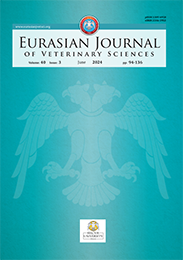| 2025, Cilt 41, e0448 |
| [ PDF ] [ Benzer Makaleler ] |
| Evaluation of Factors Affecting Prognosis in Traumatized Cats |
| Ebrar Merve Eris, Hilmican Ergin, Kurtulus Parlak |
| Selcuk University, Faculty of Veterinary Medicine, Department of Surgery, 42003, Konya, Türkiye |
| Keywords: ATT, Cat, mGCS, Trauma |
| Downloaded:6 - Viewed: 17 |
|
This study aims to evaluate the factors affecting the prognosis of cats presented with
trauma complaints based on the type of trauma, clinical scoring (ATT and mGCS),
laboratory measurements, and radiographic examination findings. The study
materials consist of clinical (Animal Trauma Triage (ATT) Glasgow Coma Scale
(mGCS), radiographic examinations, and laboratory analyses of a total of 50 cats of
various breeds, ages, and weights, admitted to the Animal Hospital of the Faculty
of Veterinary Medicine at Selcuk University with trauma complaints. According
to clinical examination findings, the mean ATT was 3 in surviving cats and 8 in
deceased cats, while the mGCS score was 17 in surviving cats and 14 in deceased cats.
The results were statistically significant in deceased cats. Radiographic examinations
revealed that thoracic and abdominal trauma were more common in deceased cats.
Laboratory results showed statistically significant correlations for BUN, total protein,
albumin, hematocrit, and red blood cell levels, with notable differences between
surviving and deceased cats. It is suggested that the systematic application of these
diagnostic tools will improve prognostic accuracy for traumatic injuries in cats and
lead to better management and treatment outcomes. Additionally, future studies on
traumatized cats should consider repeating analyses at specific intervals during the
treatment process to better identify prognostic factors that influence mortality.
|
| [ PDF ] [ Benzer Makaleler ] |





